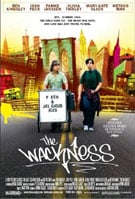Movies about young men growing up usually take too many cues from their navel-gazing heroes. The characters and the movie alike get so wrapped up in their own issues and fascinating thoughts that both lose track of the fact that everyone lost interest in them hours ago. Through impeccable casting, a clever period setting and a screenplay that packs a few surprises, Jonathan Levine’s The Wackness avoids all of these pitfalls. Telling a story clearly based on his own experiences growing up in early-90s New York City, Levine still dares to let us dislike his protagonist. Luke Shapiro (Josh Peck) is just a mixed-up kid of course, but he’s also a blustery, self-centered twit—a real teenage boy if there ever is one. With a committed performance from Peck, Levine creates a rare character who is both pitiable and lovable, even when the audience probably wants to wring his neck.
In the summer of 1994, Luke kills time after high school graduation by selling weed to classmates who tolerate him largely for his drug connections. With his parents squabbling constantly over money issues, Luke spends afternoons with Dr. Squires (Ben Kingsley), a psychiatrist who accepts payment in marijuana and insists that Luke ought to stop being so mopey and be a kid already. Luke’s best prospect is Stephanie, Squires’ stepdaughter and one of the cool kids who ignored him, until the two of them are the only ones left as the rest of the Upper East Side decamps for the Hamptons. She accompanies him as he sells on the street, visiting a handful of the regular stoners but, inexplicably, never running into trouble.
When Stephanie isn’t around, Squires is, having decided his icy marriage (to Famke Janssen, of all people!) can be alleviated by acting like a kid with Luke. They tag bus stops and smoke pot on the street, all things that have become arrest-worthy offenses under Giuliani’s regime. Though Luke’s romance with Stephanie becomes the emotional crux of the story, it’s the unlikely friendship between the two of them that becomes the story’s focus, as Squires figures out how to reclaim his life on his own terms and Luke, in a way, finds a way to snap out of his teenage funk.
The central metaphor of the movie—that New York City’s messiness is as valuable as one’s own messy thoughts and feelings—never quite gels. But The Wackness contains enough genuine insight into its characters and warm humor that it never really needed a Big Message to begin with. Levine’s dreamy cinematography and hands-off approach to the actors accomplishes the realism he needs to get away with a largely familiar coming-of-age story; the solar flares and water on the lens in a shower scene between Stephanie and Luke speak far more about the power of teenage lust than dialogue ever could.
Kingsley is occasionally over-the-top but always engaging as Squires, and Thirlby carries on with her hipster-girl appeal, but it’s really Josh Peck takes control and makes The Wackness something special. A former fat kid child actor, Peck convincingly carries the weight of the world on Luke’s over-privileged shoulders. Never asking the audience for sympathy, Peck still gets it by drilling beneath Luke’s faux-street bluster to find the hurting child underneath.
All this makes The Wackness sound like a dull drama, but with a title like that, how could it be? Packed full of period slang and even a few “fly girls,” the movie mines its period setting for comedy as much as for metaphor. Even when the slang becomes grating (just wait ‘til you hear the moment when the title is said out loud), it all fits in with the movie’s sweetly nostalgic and sardonic tone. Coming out July 3rd, The Wackness is a drug-tinged love letter to summertime that’s worth a look.
Staff Writer at CinemaBlend












